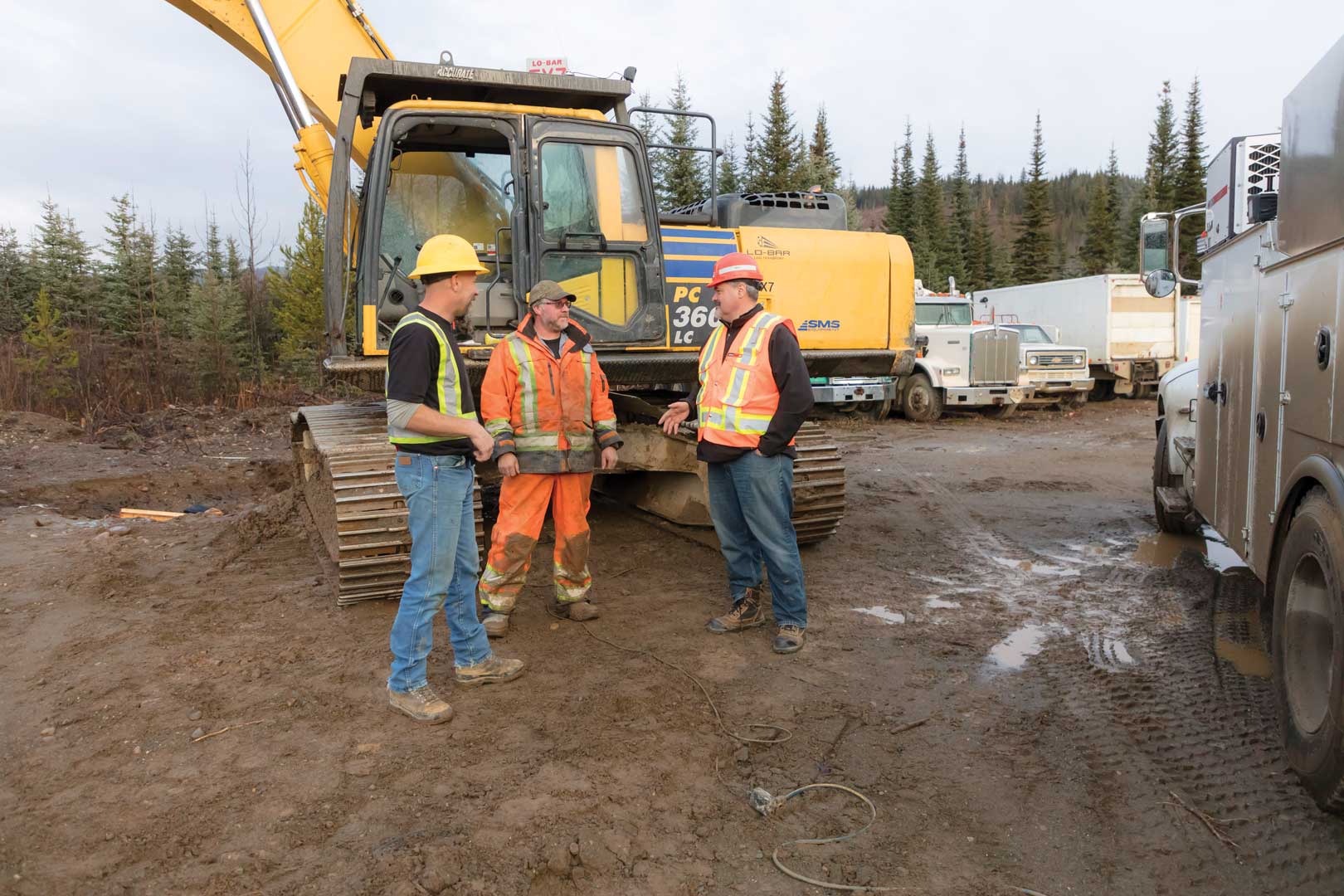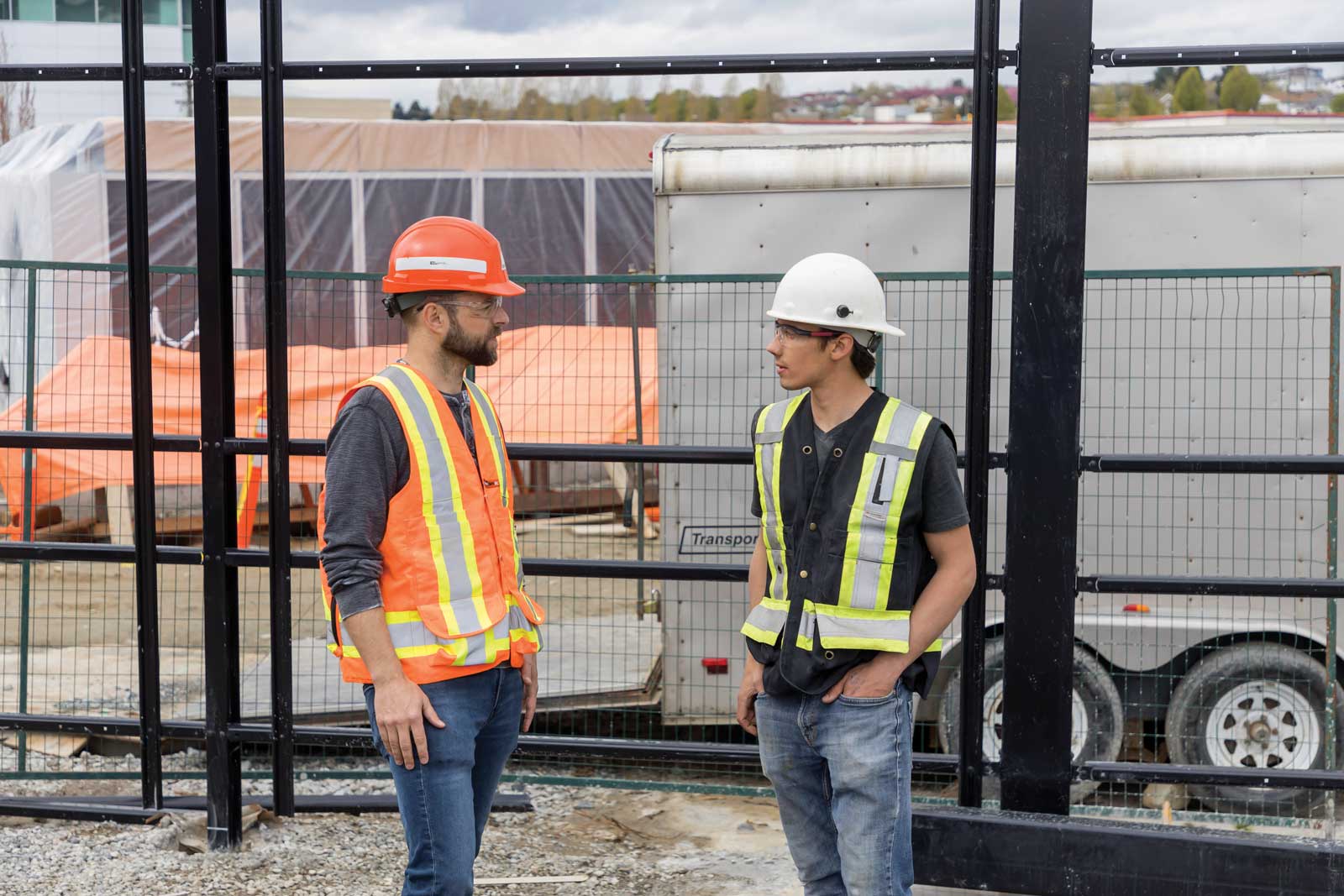
It’s dark and the kids have already had dinner by the time Kris gets home from work. He pours himself a drink – he notices he’s been doing that more often lately. Thinking back on the day, he wonders why he got so upset at Josh for dropping those tools. His thoughts shift to whether the job will be put on hold if they keep seeing product delays due to the pandemic. What will he do if he gets laid off? How will he support his family? He takes another sip of his drink. He feels exhausted and depleted. “Better suck it up,” he thinks to himself, “have to be at work early tomorrow.”
In the construction industry, a story like Kris’s is not uncommon. In a 2019 WorkSafeBC study conducted with workers and employers in the construction sector, 55 per cent of respondents reported having a mental health concern and/or substance misuse. Many workers and employers would agree that mental health is an important issue. Yet, the stigma associated with mental health means that workers fear the consequences of opening up at work to get the help they need.
“A help-seeking culture has not been normalized in construction as much as it has in other industries, and we’ve seen the devastating effects this has had on the mental health of workers,” said Ashley Spetch, Ph.D., chief mental health officer for WorkSafeBC.
Construction workers face multiple stressors
When it comes to why mental health concerns are more prevalent in the construction industry, Spetch says it’s a perfect storm of different pressures that eventually take their toll: job insecurity and higher unemployment rates can lead to financial strain, long hours and the unpredictable nature of the work can add pressure and affect workers’ sleep, and the potential for discrimination in the workplace and other safety risks can increase tension and anxiety.

“These factors are interconnected and, far too often, workers cope by self-medicating – with alcohol, marijuana or other stimulants – just to get through the day,” Spetch said.
Jaret Swanson, manager of occupational health and safety consultation and education services at WorkSafeBC describes the construction industry as “feast or famine” when it comes to steady work. “It’s a constant revolving door from a stability perspective,” he said. “You’re always looking for your next job, which can’t help but create anxiety.”
Of course, stressors introduced over the past year due to the Covid-19 pandemic mean that construction workers have had additional strains on their mental health on top of the usual job-related pressure. Anxiety around being essential workers during a public health crisis, feelings of isolation and the loss of coping mechanisms such as spending time with friends, have many workers feeling mentally worn out, tired and stretched.
Creating a workplace culture that supports mental health
The other challenge, according to Spetch, is a workplace culture where there is long-standing stigma surrounding mental health and not much support for help-seeking. In fact, 79 per cent of workers feel there is some level of stigma associated with mental health concerns – a statistic that goes up to 85 per cent when substance use and addiction are involved.
The study by WorkSafeBC also highlighted the internal and external pressures that make it difficult for people to admit and share their concerns. These include perceptions that concerns about mental health are perceived as a sign of weakness, knowledge gaps that make it hard to recognize symptoms and behaviours, and a “macho” and “tough” industry culture that make workers fear repercussions for disclosing their concerns.
“The ‘suck-it-up’ culture we often see in construction needs to change so that workers and employers feel more comfortable and are able to recognize how they’re feeling and when they need to recharge.”
– Ashley Spetch, Ph.D., WorkSafeBC
“We need to normalize mental health because we all have it,” said Spetch. “The ‘suck-it-up’ culture we often see in construction needs to change so that workers and employers feel more comfortable and are able to recognize how they’re feeling and when they need to recharge.”
So, what can site supervisors and managers do to change the culture and help others who may have concerns about their mental health? It begins with recognizing the signs that someone may be struggling – for example, changes in behaviour, looking tired, ongoing lateness for a shift and having a shorter fuse. The next step is to have a conversation with that person, which could look something like:
“Kris, I’ve noticed some changes in your behaviour lately. You’ve been late three times and you seem to have a short fuse, like when you yelled at Josh for dropping those tools earlier. It’s not like you and I’m concerned about you. I want to make sure you’re okay and if you need anything from me.”
When talking to workers who may be having a hard time, Spetch suggests that a good approach is to normalize the situation and the worker’s feelings – while ensuring supervisors are not stepping into a counsellor role themself. For example, Kris’s supervisor might add:
“I went through a divorce last year and there was a stretch of time where I found I had a real short fuse, but doing some online meditation really helped me.”
There is good news, though. Recent studies show that construction workers are shifiting their perspective. In fact, 88 per cent of workers believe it’s possible to recover from mental health struggles and 86 per cent are comfortable working with someone who has returned to work after dealing with mental health concerns. The global pandemic has also helped make feelings of emotional angst and mental distress more acceptable. This has encouraged more people of all ages and occupations to seek help when they need it.

“We need to focus on creating psychologically safe work environments for the construction industry,” said Swanson. “Recognizing that this issue is prevalent in our industry is a positive step in the right direction.”
During these unprecedented times, it’s more important than ever to check in with people, whether it’s in a five-minute huddle at the start of a shift or at different phases throughout a big project. Recognizing and talking about common stressors and the feelings associated with them will change the workplace culture overtime. Fostering a supportive crew and good relationships between supervisors and unions is also a critical factor.
“The goal is to help people see that almost everyone struggles at some point in time, but we have to recognize the signs before they become problematic,” said Spetch. “You don’t need to have a clinical mental health diagnosis to seek help. Feeling crummy, irritable, tired or simply not like yourself are signs that it’s time to recharge your batteries. This is the first step to prevention and becoming more mentally resilient.”
She says that being able to recognize how you’re feeling and what you can do to recharge is a skill that takes time to develop and is different for everyone. There are many free online resources, such as mediation apps, articles on coping strategies and guides, that are great first steps to help workers and employers develop mental wellness skills.
Spetch said, “Having the self-awareness to understand what you need to do to feel psychologically healthy is a strength, not a weakness. We need to recognize that people are struggling and create a culture of caring, empathy, safety, support and respect.”
WorkSafeBC has created resources for employers to support workers’ mental health during Covid-19, which are available on www.worksafebc.com.